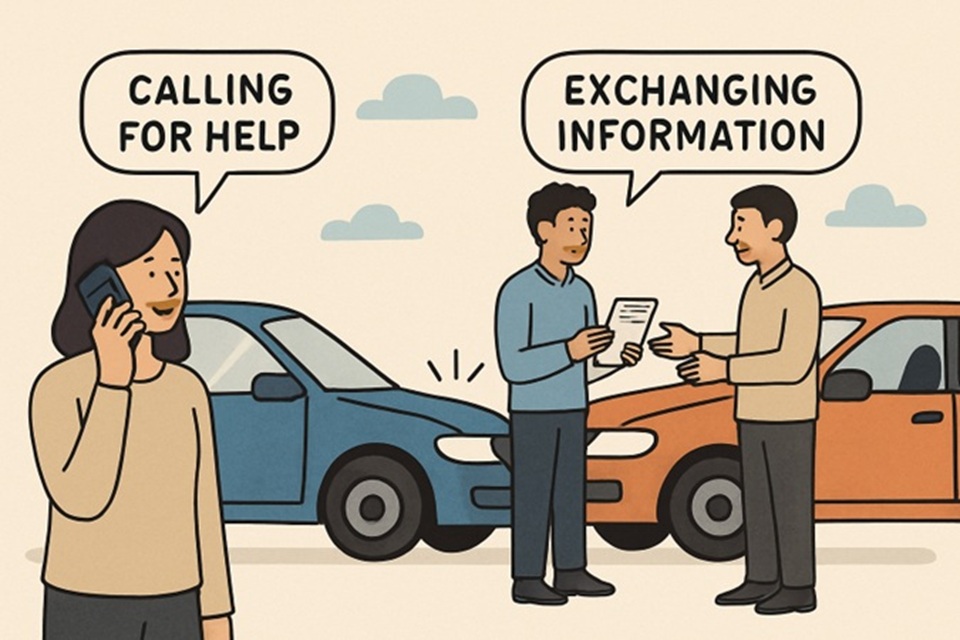Key Takeaways:
- Prioritize safety by assessing injuries and moving to a secure location.
- Contact emergency services promptly to report the accident.
- Document the scene thoroughly for insurance and legal purposes.
- Exchange information with all parties involved.
- Seek medical attention, even if injuries aren’t immediately apparent.
- Notify your insurance company as soon as possible.
- Consult a car accident lawyer to understand your legal rights.
Introduction
Experiencing a car accident can be sudden and confusing, often leaving you unsure of what steps to take next. Making smart decisions in the immediate aftermath is essential for your safety, well-being, and legal protection. Consulting with a car accident attorney early can greatly improve your ability to navigate post-accident challenges and safeguard your interests.
Remaining calm and systematic helps ensure everyone’s safety and streamlines the process with insurers, health providers, and authorities. Knowing how to properly document the incident, obtain medical attention, and protect your rights will set a clear course toward recovery and fair compensation.
Your actions at the scene influence your personal safety and the outcome of any subsequent insurance or legal matters. Being prepared can reduce stress and avoid common pitfalls that may delay your claims or recovery process.
Establishing a record of what happened, what injuries were sustained, and the damages incurred serves as an invaluable tool for both medical and legal matters. Companies and courts rely heavily on accurate information when evaluating responsibility and compensation. Reviewing successful case results can give insight into what factors make a difference in securing rightful outcomes after an accident.
Assess Safety & Move To A Secure Location
After an accident, your first priority is the safety of yourself and any passengers. Carefully check for injuries and, if possible and safe, move vehicles from traffic to prevent further harm. Never exit your vehicle into oncoming traffic or unsafe road conditions; use your hazard lights to alert other drivers and stay inside until help arrives, especially on highways or at night. For more in-depth post-accident safety tips, refer to this resource from the National Highway Traffic Safety Administration.
Contact Emergency Services
Immediately call 911 to report the accident. Clearly state the location, any injuries, and the number of people involved. Police and medical personnel are crucial in securing the area and documenting the incident. A police report provides an official record that can be critical for any insurance or legal proceedings, so cooperate fully and avoid admitting fault until an investigation is complete. For a comprehensive list of what to say (and not say) to dispatchers, see this Consumer Reports guide.
Document The Accident Scene
Use your smartphone or camera to photograph the scene thoroughly. Capture images of vehicle damage, license plates, road signs, intersections, traffic signals, and any visible injuries. Photos of skid marks, debris, and weather conditions can also provide important context. Take notes on how the accident occurred, the time of day, and statements made by others involved. These details serve as crucial evidence for resolving disputes with insurance companies and can prove invaluable in legal settings.
Exchange Information With Other Parties
Collect detailed contact and insurance information from every driver involved, including names, addresses, phone numbers, insurance policy numbers, license plate numbers, and vehicle identification numbers (VINs). If possible, take clear photos of each party’s driver’s license and proof of insurance for accuracy. It’s also helpful to gather names and contact details of any witnesses who saw the accident.
Seek Medical Attention
Do not assume you are unharmed if you don’t notice immediate pain. Many car accident injuries, like whiplash, internal bleeding, or concussions, can have delayed symptoms. Visit a healthcare provider as soon as possible for a thorough evaluation. Keep every record and medical bill, as these will be needed for health insurance and injury claims and may be essential in legal proceedings.
Notify Your Insurance Company
Promptly contact your insurance provider to report the accident and start the claims process. Provide all requested documentation and answer questions truthfully without speculating about fault. Every insurance company has deadlines for filing claims, so act quickly to avoid financial penalties or jeopardizing your coverage. Never provide a recorded statement to another party’s insurer unless you have guidance from your attorney or insurer.
Consult A Car Accident Lawyer
Navigating legal and insurance-related questions after an accident can be complex, particularly if injuries or significant damage are involved. Consulting a car accident lawyer helps you understand your rights, potential compensation, and the best course of action for protecting your interests. An experienced attorney can handle negotiations with insurance providers and represent you if the case escalates to court. Legal consultation is especially valuable if you have suffered injuries, face disputes, or are being pressured to settle quickly.
Being organized and thorough after a car accident can prevent future complications and help you receive the support and compensation you deserve. Taking the right actions immediately after the incident is vital for physical recovery, legal protection, and financial peace of mind.
